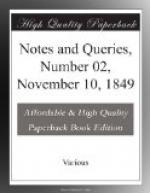But there are books of another kind—books {18} which our worthy bibliopoles designate as “standard works.” These are the books of competent workmen—books which are the result of honest labour and research, and which from the moment of their publication assume a permanent station in our national literature. Even in such books there are many things incomplete, many things erroneous. But it is the interest of every man that such books should be rendered as complete as possible; and whatever tends to illustrate or correct works of that class will be sure of insertion in our columns.
We would point to Macaulay’s England, and Hallam’s Introduction to the Literary History of the 15th, 16th, and 17th Centuries, his Middle Ages, and his Constitutional History, and we may add, as illustrations of a different kind, The Annals of the Stage of our excellent friend Mr. Collier, and The Handbook of London of our valued contributor Mr. Peter Cunningham, as examples of the sort of publications to which we allude. Such were the books we had in our mind, when we spoke in our Prospectus of the “Notes and queries” becoming, through the inter-communication of our literary friends, “a most useful supplement to works already in existence—a treasury towards enriching future editions of them.”
Another correspondent—a bibliographical friend—suggests that, for various reasons, which bibliographers will appreciate, our Prospectus should have a place in the body of our work. We believe that many of our readers concur in a wish for its preservation, and it will therefore be found in the Number now before them.
One suggestion again urges us to look carefully to Foreign Literature, and another points out the propriety of our making our paper as British as possible, so that our topographical facts should, as far as practicable, be restricted to the illustration of British counties, and our biographical ones to such as should contribute towards a Biographia Brittanica.




